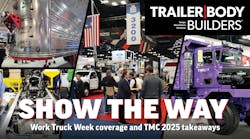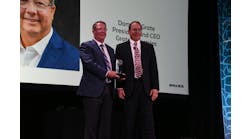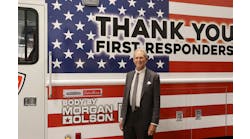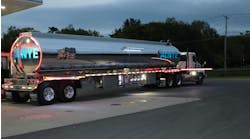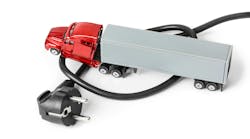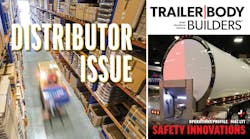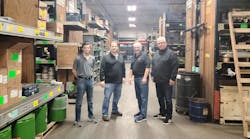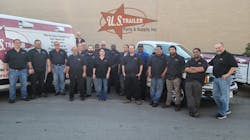FORTY years ago, Adam Cyze Sr., a veteran of the trailer parts business, was keenly aware the OEM-oriented distribution model made getting parts unnecessarily difficult for repair shops. So he had the idea to launch an all-makes trailer parts supply business to serve the Chicago area, and US Trailer Parts & Supply was born.
“I give him a lot of credit,” son Joe Cyze, current USTP principal and president, recalls. “He had the vision of not having to run around to each individual dealership. Lo and behold, he scraped up some money and started the company.”
Again, using his knowledge of the industry, Adam Sr. “worked his tail off” to secure distribution deals with a wide range of leading trailer OEMs and aftermarket parts suppliers and the business began to grow.
“He always felt—and I totally agree with him, 100%—that price is important in this industry, and it always has been. But the service aspect of it is what sets you apart,” Joe says. “If you house multiple lines under one roof, you let the customer spend his day planning how he's going to maximize the dollars in his space, how he's going to get the most out of his mechanics instead of having to worry about running to 14 different places to pick up 14 different products. The variety we had on hand really increased our amount of customers.”
And personal relationships were critical in getting established. Joe recalls, in his early days working for his father, that many customers were friends who also had family members in the business—and some of those relationships continue to this day.
Growth has meant moving into successively larger facilities starting in the 1990s and opening a branch location in Milwaukee. The current Chicago facility features 38,000 square feet of space, and USTP stocks some 5,500 line items.
“One of the things we've been really successful with over the years is trying to be competitive on the A and B items, but also having the C and D items on the shelf—the parts that are not very common, maybe an old Reyco part or an old Fruehauf part for a trailer that a lot of these guys hold onto. We just felt it was important to have a good blend.”
Additionally, Adam Sr. was committed to parts and only parts; he never dabbled in trailer sales or repair and never wanted to compete with his customers. Essentially, he knew from experience that sweetheart deals for one shop from a parts supplier put another shop at a competitive disadvantage.
“By strictly doing parts only, his philosophy was always: We'll treat you fair; we'll give you [our customers] all the same price. So if you have a better business model in your shop—if you have lower costs or a better wage rate or a better service rate—it's up to you; we're not going to be the one that's going to make or break the deal. We're going to treat everybody fair.”
More recently, however, Joe notes that in the Chicago market some suppliers have begun signing shops to national accounts—putting other shops at the competitive disadvantage USTP has worked hard to avoid.
And that’s where the company’s own “very strong relationships” with Aurora Parts, Great Dane, and Stoughton Trailers, for instance, benefit their customers.
“We still have direct relationships with the vendors and the manufacturers, and it's given us the best of both worlds,” he says. “On all the common items, the big three really help us out. We get shipments five days a week, which has been huge, as far as getting the purchase to the customer as quickly as possible.
“But on a hard-to-find items, having that direct connection with the manufacturers has helped us because it may take a supplier three or four weeks to get it into them and then another day or so to transfer it to me; so we kind of cut out the middlemen on certain things.”
About 70% of USTP business comes from the Midwest region, with the remaining 30% spread among the rest of the Lower 48 states, Joe reports.
Times change
Of course, any business has its up and downs. USTP tried several locations outside the Chicago area but, Joe explains, the effort took focus away from the core business.
More significantly, Joe began to sense the operation had grown stale. Key members of the team were retiring; the delivery fleet was aging; and the information technology the company relied on was inadequate. A business can’t stay competitive playing catchup.
“I'll go back, say 15 years, and at that time we were rocking and rolling—then I think we got complacent,” Joe says. “We were too proud; we had to be knocked down, to be honest with you. And over the last three or four years we realized that, in any business, you cannot be complacent; you can't be satisfied with what you did yesterday—because you'll find out it's not good enough.”
So, in January, Joe decided to go all-in and bought out his father and brother Adam Jr., while brother Jim—who has had his own successful career in the printing industry—came on as the other principal and CFO. Jim’s son James joined soon after and is now in charge of the IT transformation in addition to representing the third generation of family in the business.
Technology-driven decisions
Since the beginning of the year, the entire USTP fleet serving the Chicago and Milwaukee area has been replaced, including seven new stake trucks along with new vans and pickups all with satellite tracking—a “huge upgrade” that allows management to monitor routes, track daily performance and keep customers informed.
Additionally, the company has invested nearly $100,000 in system-wide IT upgrades.
“We were always playing catch-up when business would increase. We didn't look at the data—or we didn't have the data—to know we needed to add another delivery driver, or we needed to have X amount more on the shelf,” Joe says. He credits Jim with “digging into the data” and enabling USTP to take a new data-driven approach to forecasting, management and planning. USTP now employs data as a central component in all business decisions.
“I don't think it's any secret the trailer market has kind of lagged behind the tractor OEMs and the automotive business—and there's so much technology that’s out there,” he says.
E-commerce
Additionally, the upgraded IT system is helping the company move into the world of e-commerce. The company’s new website launched in September.
“It was a huge investment, and we're kind of in the infancy stage—we have a lot to learn,” Joe says. “We’re adding information, pictures—things that are going to make it easier [to do business].”
The web portal allows customers to order multiple parts and distinguish them by work order or trailer numbers, for instance.
“I go to so many of these shops and there's still some guys that are old school: They have 10 trailers and they pull out 10 scraps of paper with 10 workorders,” Joe says. “I tell them that if you go to our website, you just add it to your cart—but when you add it to your cart you’re able to say this is for trailer number 123 and that is for number 456. They say wow, that would be great.”
Likewise, the website is designed to make finding the correct parts more efficient.
“I’ve got guys who have been with me for 30-plus years in my parts department, but sometimes the terminology is crazy in this business—as far as what one guy calls a product or an item as opposed to another,” he says. “So why don't we just allow a customer on the website to snap a picture and send it to us. Not only will we be able to identify a hard-to-find or odd part, but at the same time we can actually get an idea of the complete job.
“If you have a wreck—say it's the front corner of a trailer—and you're asking for three items, we may see from that picture something your estimator missed and you’re going to need parts four, five and six.”
Also, with USTP annually among the top dealers for Aurora Parts, Joe sits on their dealer advisory panel and gets an early look at the various technology initiatives Aurora is bringing to the marketplace.
“They’ve invested in their e-commerce site and we’re working with them to increase our business and strengthen our relationship with our partners,” he says. “In today's market, the strength of the relationships that you have, not only with your customers but also with your vendors, is very important.”
Those relationships are particularly important, he notes, since the COVID-19 outbreak. Indeed, USTP business is up 35+% over last year despite the pandemic slowdown in the economy driven primarily by the strength of USTP’s long-term customer base coupled with a relentless pursuit to provide exceptional service at competitive prices.
“We’ve been very fortunate in our growth this year,” Joe says. “We're seeing that now things are kind of freeing up a little bit and parts are becoming a little bit harder to come by—whether it's plant closings, or reduced staff in places—so the relationships that we have with our vendors are really helping us through these times.”
New blood
Technology also serves to bridge the experience gap between veteran parts staff and the young people the trailer parts and service industry desperately needs to attract.
“Going back to when I was a delivery driver 20 years ago, for every customer I either visited their facility or I knew them personally. But with all the [corporate] roll-ups and the retirements or even the deaths of principal owners in some of these repair facilities, we've had to take a different approach,” Joes says. “And we had to realize that there's more young people coming into the business. While the relationships are not there, they are still looking at ‘How are you going to make my life easier?’”
Training is the key. Joe explains that a company can always spend more money on trucks or computers, but a business has to invest in people to succeed.
“I felt we had to make a commitment to really offer the training that our people needed,” he says. “I look at competitors. I look at the suppliers. There’s people who have been in the business a while that are very good at giving information. And there’s people who are going through the motions.
“I felt we had to have a team that, regardless of who you spoke to, they would either have the knowledge or they would get the knowledge back to you as quick as possible—they wouldn't just hang up the phone. We're trying to take the old-school approach using modern technology.”
To help do that, USTP partners experienced employees with the new hires.
“We're putting a huge effort into training them to understand that you can't just come in and hope that you're going to find the answer on your phone in a relatively quick time,” he says. “We position them throughout the sales office as a ‘tag team’ so that they can hear the conversation to get a sense of how you word things—taking in the knowledge from the guys that have been here.
“And when I say ‘knowledge,’ that’s not just the parts knowledge—it’s the communication knowledge. You can't sit there and look down like you're talking to your phone all the time. Talk to people and treat people the way you want to be treated. And that goes to building the relationship.”
Similarly, he’s concerned about newcomers to the trailer parts market coming in with nothing but the latest technology and margin-destroying pricing.
“If we're successful, we'll continue to build on our relationships with our customers,” Joe says. “We'll find that there's future expansion, there's future growth—but how do we control that growth? How do we take the US Trailer Parts name and expand it not only locally, but regionally, maybe nationally?
“I don't know what the future holds; I just know that we have to take care of our core business and our core customers if we want the future to be bright. To get new customers, I want the word of mouth to be ‘these guys really know what they're talking about; they treat me fair and they get the part when I need it.’”
